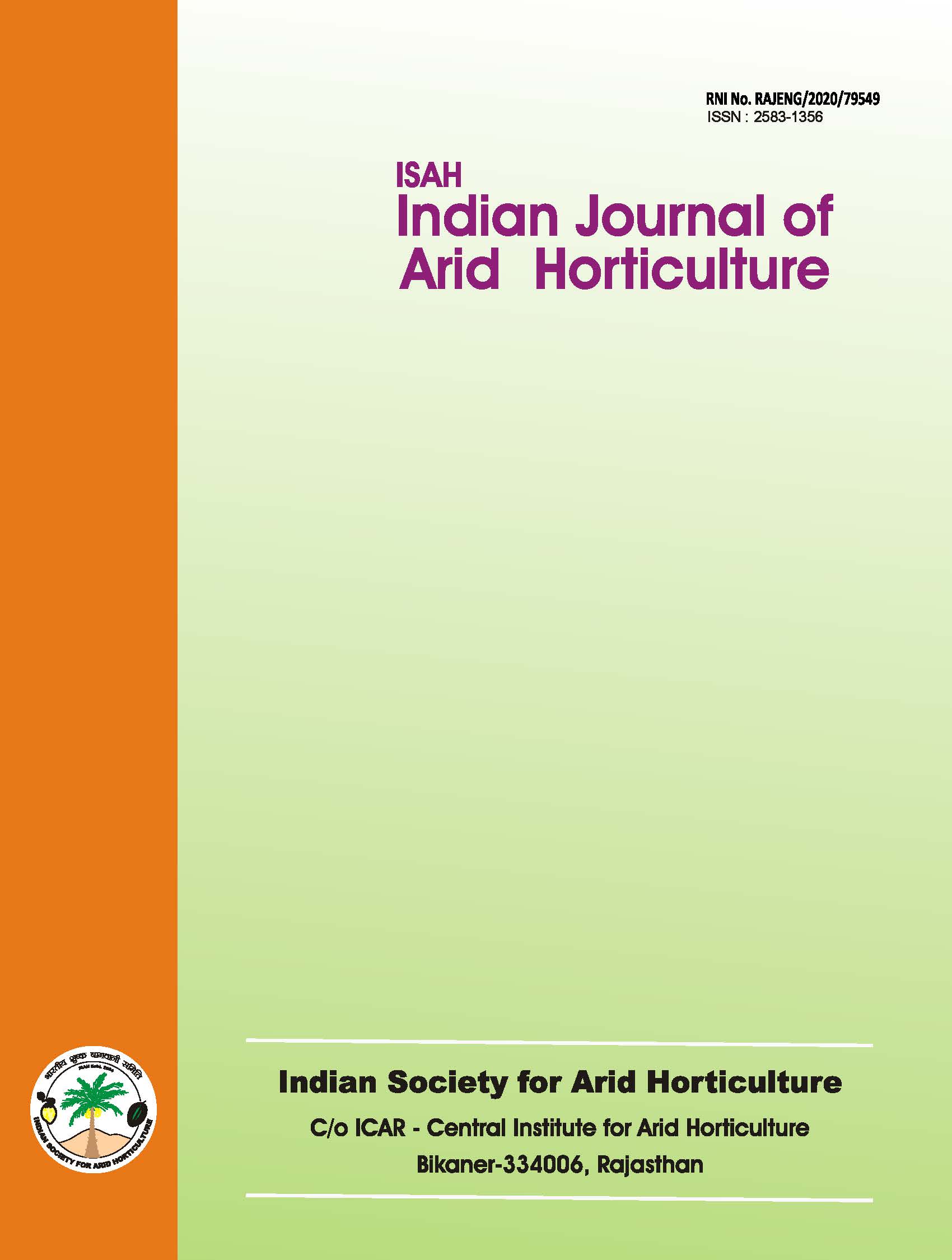Variability in date palm (Phoenix dactylifera L.) genotypes in Kachchh, India: a study on morphological and fruiting characteristics
DOI:
https://doi.org/10.48165/ijah.2025.7.1.4Keywords:
Cluster analysis, date palm, genetic diversity, morphological traits, PCAAbstract
This study investigates the morphological diversity among 38 date palm genotypes grown in Kachchh, India, using Principal Component Analysis (PCA) and Hierarchical Clustering. A dataset comprising 27 quantitative and qualitative traits were analysed. The correlation analysis revealed significant associations between key traits such as pulp thickness, fruit weight, and pulp-to-stone ratio, which are crucial for fruit quality improvement. PCA identified major traits contributing to morphological variability, with the first three principal components explaining over 52% of total variance. Hierarchical clustering grouped genotypes into four distinct clusters, demonstrating significant genetic diversity. The findings highlight the importance of fruit-related traits in genetic differentiation and provide a framework for breeding superior date palm genotypes.
Downloads
References
Ahmed, M. V. O. M., Bouna, Z. E. O., Lemine, F. M. M., Djeh, T. K. O., Mokhtar, T., & Salem, A. O. M. (2011). Use of multivariate analysis to assess phenotypic diversity of date palm (Phoenix dactylifera L.) cultivars. Scientia Horticulturae, 127, 367–371. https://doi.org/10.1016/j.scienta.2010.11.011
Ahmed, R., Anjum, M. K., Ercisli, S., Malik, W., Sakar, E., Marc, R. A., & Karunakaran, R. (2023). Physico-chemical properties revealed huge diversity in 50 date palm (Phoenix dactylifera L.) genotypes. Folia Horticulturae, 35(1), 107–122. https://doi.org/10.2478/fhort-2023-0008
Alahyane, A., Elateri, I., Alahyane, H., Ayour, J., Meddich, A., Ait-Oubahou, A., Benichou, M., & Abderrazik, M. E. (2022). Assessment of phenotypic diversity of some local Moroccan date palm varieties and clones (Phoenix dactylifera L.) from Zagora region, Southern Morocco. Jordan Journal of Biological Sciences, 15(4), 671–678. https://doi.org/10.54319/jjbs/150416
Alrashidi, A. H. M., Jamal, A., Alam, M. J., Gzara, L., Haddaji, N., Kachout, M., Abdelgadir, A., Badraoui, R., & Elkahoui, S. (2023). Characterization of palm date varieties (Phoenix dactylifera L.) growing in Saudi Arabia: Phenotypic diversity estimated by fruit and seed traits. Notulae Botanicae Horti Agrobotanici Cluj-Napoca, 51(1), 12996. https://doi.org/10.15835/nbha51112996
Anonymous. (2005). Descripteurs du Palmier dattier (Phoenix dactylifera L.). IPGRI, Rome, Italy; Global Environment Fund, Washington, USA; United Nations Development Program, New York, USA; National Institute of Agronomic Research, Algeria, Morocco and Tunisia.
Anonymous. (2018). Guidelines for the conduct of test for Distinctiveness, Uniformity and Stability on date palm (Phoenix dactylifera L.). Protection of Plant Varieties and Farmers’ Rights Authority (PPV&FRA), New Delhi, Government of India. pp. 1–28.
Bedjaoui, H., & Benbouza, H. (2020). Assessment of phenotypic diversity of local Algerian date palm (Phoenix dactylifera L.) cultivars. Journal of Saudi Society of Agricultural Sciences, 19, 65–75. https://doi.org/10.1016/j.jssas.2018.06.002
Elhoumaizi, M. A., Saadi, M., Oihabi, A., & Cilas, C. (2002). Phenotypic diversity of date palm cultivars (Phoenix dactylifera L.) from Morocco. Genetic Resources and Crop Evolution, 49, 483–490.
El-Kadri, N., Mimoun, M. B., & Hormaza, J. I. (2019). Genetic diversity of Tunisian male date palm (Phoenix dactylifera L.) genotypes using morphological descriptors and molecular markers. Scientia Horticulturae, 253, 24–34. https://doi.org/10.1016/j.scienta.2019.04.026
Elsafy, M., Garkava-Gustavsson, L., & Mujaju, C. (2015). Phenotypic diversity of date palm cultivars (Phoenix dactylifera L.) from Sudan estimated by vegetative and fruit characteristics. International Journal of Biodiversity, 2015, 610391. https://doi.org/10.1155/2015/610391
Ennouri, K., Ayed, R. B., Ercisli, S., Smaoui, S., Gouiaa, M., & Triki, M. A. (2018). Variability assessment in Phoenix dactylifera L. accessions based on morphological parameters and analytical methods. Acta Physiologiae Plantarum, 40, 5. https://doi.org/10.1007/s11738-017-2583-6
Gros-Balthazard, M., & Flowers, J. M. (2021). A brief history of the origin of domesticated date palms. In J. M. Al-Khayri, S. M. Jain, & D. V. Johnson (Eds.), The date palm genome Vol. 1: Compendium of plant genomes (pp. 55–74). Springer, Cham. https://doi.org/10.1007/978-3-030-73746-7_3
Hammadi, H., Mokhtar, R., Mokhtar, E., & Ali, F. (2009). New approach for the morphological identification of date palm (Phoenix dactylifera L.) cultivars from Tunisia. Pakistan Journal of Botany, 41(6), 2671–2681.
Jaradat, A. A., & Zaid, A. (2004). Quality traits of date palm fruits in a center of origin and center of diversity. Journal of Food Agriculture and Environment, 2, 208–217.
Muralidharan, C. M., Baidiyavadra, D. A., & Sharma, K. M. (2019). Variability in date groves of Kachchh and conservation through field gene bank. In Technical Bulletin 05/2019, Date Palm Research Station, Sardarkrushinagar Dantiwada Agricultural University, Mundra-Kachchh, Gujarat, India. pp. 1–32.
Raza, M. K., Jaskani, M. J., Naqvi, S. A., & Awan, F. S. (2020). Exploitation of phenotypic diversity in male accessions of date palm (Phoenix dactylifera) and its use in germplasm conservation. International Journal of Agriculture and Biology, 24, 133–144.
Simozrag, A., Chala, A., Djerouni, A., & Bentchikou, E. M. (2016). Phenotypic diversity of date palm cultivars (Phoenix dactylifera L.) from Algeria. Gayana Botanica, 73, 42–53.

